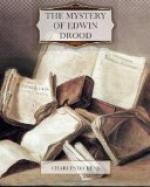All this did not improve the gritty state of things in London, or the air that London had acquired in Rosa’s eyes of waiting for something that never came. Tired of working, and conversing with Miss Twinkleton, she suggested working and reading: to which Miss Twinkleton readily assented, as an admirable reader, of tried powers. But Rosa soon made the discovery that Miss Twinkleton didn’t read fairly. She cut the love-scenes, interpolated passages in praise of female celibacy, and was guilty of other glaring pious frauds. As an instance in point, take the glowing passage: ’Ever dearest and best adored,—said Edward, clasping the dear head to his breast, and drawing the silken hair through his caressing fingers, from which he suffered it to fall like golden rain,—ever dearest and best adored, let us fly from the unsympathetic world and the sterile coldness of the stony-hearted, to the rich warm Paradise of Trust and Love.’ Miss Twinkleton’s fraudulent version tamely ran thus: ’Ever engaged to me with the consent of our parents on both sides, and the approbation of the silver-haired rector of the district,—said Edward, respectfully raising to his lips the taper fingers so skilful in embroidery, tambour, crochet, and other truly feminine arts,—let me call on thy papa ere to-morrow’s dawn has sunk into the west, and propose a suburban establishment, lowly it may be, but within our means, where he will be always welcome as an evening guest, and where every arrangement shall invest economy, and constant interchange of scholastic acquirements with the attributes of the ministering angel to domestic bliss.’
As the days crept on and nothing happened, the neighbours began to say that the pretty girl at Billickin’s, who looked so wistfully and so much out of the gritty windows of the drawing-room, seemed to be losing her spirits. The pretty girl might have lost them but for the accident of lighting on some books of voyages and sea-adventure. As a compensation against their romance, Miss Twinkleton, reading aloud, made the most of all the latitudes and longitudes, bearings, winds, currents, offsets, and other statistics (which she felt to be none the less improving because they expressed nothing whatever to her); while Rosa, listening intently, made the most of what was nearest to her heart. So they both did better than before.
CHAPTER XXIII—THE DAWN AGAIN
Although Mr. Crisparkle and John Jasper met daily under the Cathedral roof, nothing at any time passed between them having reference to Edwin Drood, after the time, more than half a year gone by, when Jasper mutely showed the Minor Canon the conclusion and the resolution entered in his Diary. It is not likely that they ever met, though so often, without the thoughts of each reverting to the subject. It is not likely that they ever met, though so often, without a sensation on the part of each that the other was a perplexing secret to him. Jasper as the denouncer and pursuer of Neville Landless, and Mr. Crisparkle as his consistent advocate and protector, must at least have stood sufficiently in opposition to have speculated with keen interest on the steadiness and next direction of the other’s designs. But neither ever broached the theme.




